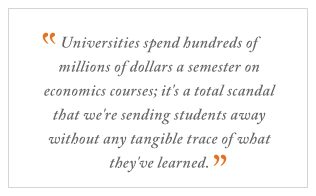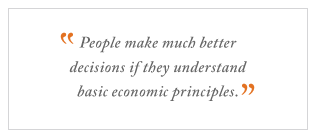The economist Kenneth Boulding said, "Mathematics brought rigor to economics. Unfortunately, it also brought mortis." If you ask Robert Frank, he'd probably say that's both true and funny, but mostly the former.
Robert H. Frank, Ph.D., is the author of several books, including the recent and very popular The Economic Naturalist: In Search of Explanations for Everyday Enigmas, and a columnist for The New York Times' "Economic Scene." He's also, like Boulding, a prominent economist: He's the Henrietta Johnson Louis Professor of Management and professor of economics at Cornell University's Johnson Graduate School of Management and the recipient of several notable awards, including the Leontief Prize for Advancing the Frontiers of Economic Thought. And he thinks current methods of teaching economics are "a total scandal."
 |
Dr. Frank is famous for asking his students to answer everyday, Jerry Seinfeldian questions, such as "Why do stores that are open 24 hours, seven days a week, have locks on the doors?" to help them understand basic principles of economics. (Answer: Because almost all doors are manufactured with locks in them, and it's cheaper to buy standard doors than to have lock-less doors custom made.) He does this, he says, not just because it's a fun assignment, but also because studying equations, graphs, and rigorous mathematics isn't necessarily the best way to teach or learn economics.
As anyone who suffered through it will tell you, Econ 101 is hard work. But Dr. Frank will tell you it's also largely pointless. Most people don't learn basic economic principles in introductory courses -- and that may include economics professors themselves.
In this interview, Dr. Frank discusses how most colleges do a "miserably bad job" of teaching economics, the effect of it on economic decision making, and why simple questions like the ones his students pose have implications from the classroom to the CEO suite.
GMJ: What was your objective for the book The Economic Naturalist? What did you hope people would take away from it?
Dr. Frank: Well, there were multiple objectives. The first goal was that I thought it was just an interesting read; the examples are fun to pick up and read one by one. But more than that, I thought it had the potential to change economists' minds about the way we try to teach students what we know. I think we've been doing a miserably bad job of that, on average, and I think it's not that hard to do a good job at it. There are some simple things we can teach that would help students leave the course with some real knowledge under their belts.
GMJ: Why do you think that economists have been doing such a bad job? And what sort of knowledge do you think students are lacking?
Frank: Studies have shown that students who have taken a traditional introductory economics course don't score any better six months later on tests that indicate economic knowledge than students who have never taken introductory economics at all. For example, one of my former students, Paul Ferraro, and his colleague Laura Taylor posed a multiple-choice question about opportunity cost to 270 undergraduates who had taken an introductory economics course, 88 people who had never taken an economics course, and then 199 Ph.D. economists at the American Economics Association annual meeting.
There were four alternative answers. The least frequently chosen alternative by the Ph.D.s was the correct one, which 21.6% chose. Only 7.4% of those students who had taken an economics course got it right, and the 88 who had never taken an economics course were almost as likely to answer correctly as the Ph.D.s -- 17.2% vs. 21.6% [respectively]. If they'd just guessed, a quarter of them should have gotten it right. So as far as we can tell, we're leaving no measurable trace on our students.
Universities spend hundreds of millions of dollars a semester on these courses and millions of teaching hours; it's a total scandal that we're sending students away without any tangible trace of what they've learned. And I think there are a couple of possible reasons why this happens.
The one I favor is that the typical introductory course has way too much stuff on the syllabus. Professors teach about 30 things a day, and the mode of presentation wraps up these ideas into equations and graphs that introductory students for the most part have trouble absorbing under the best of circumstances. They struggle with equations and graphs throughout the term, and then they leave never having grasped the essence of the handful of ideas that do most of the work in economics.
GMJ: What is the end result?
Frank: Well, we don't get complaints, and that's interesting by itself. I think the reason is that no one else knows any economics either, so no one can tell that we're sending economists out without any knowledge. And that fits in with the second hypothesis for why we're doing a bad job. Ferraro and Taylor suggested that the reason students aren't learning much in the introductory course is that the professors who teach the course took a deficient version too, like the one we're talking about, so they didn't learn the basic ideas at any profound level themselves. So how can they teach the ideas if they didn't themselves master them? And Ferraro and Taylor have some evidence for that hypothesis.
 |
GMJ: Is that why you ask students to pose and answer questions in your course?
Frank: It is. One of my remedies for the ineffective economic principles course is to throw out a lot of the detail, then choose six or seven basic principles and repeat them again and again during the term. I don't use quite as much math, graphs, algebra, and equations as the traditional course might.
The assignment that I think drives the ideas home is what I call "the economic naturalist writing assignment." Each term, students have to write two short papers, no more than a page each, and they've got to pose an interesting question based on something they've observed or experienced personally, then try to use basic economic principles to suggest an answer to it.
GMJ: Do you have a favorite?
Frank: I would say that my all-time favorite is Jennifer Dulski's question. She had just gotten married, so the question was inspired by her own experience. She asked, "Why do brides spend thousands of dollars on a wedding dress they know they'll never wear again, while grooms, who will have scores of occasions to wear a tuxedo in the future, rent a cheap one?" It's such an interesting question because of course it seems like it's backwards -- the grooms should be buying a tuxedo, and the brides should be renting a dress. What Jennifer suggested was that on big occasions, it's more important for women to make a fashion statement than it is for men. That's obviously a strong assumption, but nobody seems inclined to quarrel with it.
But starting with that assumption, an interesting set of implications about the rental market follows. What Dulski argued was that a rental company would have to keep hundreds of gowns in each size in its inventory in order to give each bride enough choice. And with that many gowns on the rack, they could rent out each of them maybe once every ten or twelve years. So they'd have to charge a huge fee just to cover their costs, say 110% of the purchase price of the gown, just to break even on the transaction. And nobody would pay 110% to rent a dress when she could buy it new for 100% -- that was Dulski's bottom line. And it sounded reasonable.
But men don't care if they wear the same style suit other guys wear to weddings. That's what all guys do anyway; they aren't going to be embarrassed by that. So the rental companies can serve their market for tuxedos by having only two or three suits in each style. The suits turn over ten or twelve times a year, so the rental companies can rent them out for about a quarter of the purchase price. So if you're trying to save money on the occasion of your wedding, which most couples are, then there's a corner you can cut.
GMJ: What good do you think a better understanding of economics would do in the general public and among economists?
Frank: Oh, people make much better decisions, for one thing, if they understand basic economic principles. You might think people are just born with an intuitive understanding of them, and to a certain extent, people do gradually acquire some economic savvy through experience. But it's very easy to come up with examples of decisions that people get systematically wrong just because they don't understand the basic economic principles that guide rational decision making in many cases. So if they know those principles, they'll do better.
GMJ: Do you think the lack of understanding of these basic principles among professional economists -- and I don't just mean academics, I mean the ones who work in business and government -- has had a noticeable result?
 |
Frank: I don't know. I wish I had an answer to that. It may be that the kind of examples they're used to dealing with and in the context they face, they get it right most of the time. I hope that's true, but I don't know. I think some economists are making wrong choices based on their incomplete understanding of a concept. In fact, Ferraro and Taylor did ask a modified version of the question designed to remove any sort of semantic stumbling blocks that might have confused test-takers in the original version, and still, 70% of Ph.D. economists got it wrong. That's better than 80% getting it wrong, but it's still not a good number.
GMJ: That also relates to one of the most interesting questions in the book, which is also one of the most socially controversial. Why have top-earner salaries grown so much faster than everybody else's?
Frank: The short answer is that the environment has grown much more competitive and has been changing in ways that make slight increments in absolute performance much more valuable. A CEO is running a business that spans a broader range of markets now than before.
Most businesses used to operate locally; now they are regional, national, or global. So if CEOs make something good happen, it happens over a much broader scope. If a rival makes a good decision and steals customers from your company, your company's loss is much bigger now than it would have been before. The odds of your company going out of existence are much bigger than before.
It used to be that companies were founded, and they survived forever. And now companies are born more often and die more quickly. So having a CEO that makes the right decisions at the top has just gotten much more important.
Also, now companies have to buy their leadership in the open market. CEOs used to be promoted from within -- if you wanted to run GM, you had to work at GM for 30 years before you would even be a credible candidate to run GM. Gradually, the dam burst on that idea.
I think the single most powerful example was when IBM hired Lou Gerstner away from RJR Nabisco. Here was a struggling computer company hiring a tobacco CEO to turn them around, which would have been laughable in the old days. Now people think if you're good at marketing, or finance, or motivating people, you can get technical people for the details. You can come in and change the course of a big organization, and that's worth tens of millions of dollars, often much more than that. But if companies have to buy their CEOs on the open market, they pay the spot market price.
GMJ: Do you think CEO talent is worth as much as it's paid?
Frank: Yeah, I do, on average. Many of them don't perform well, but half the NFL teams lose a game every Sunday too. Not everybody can have a winning record, obviously, but everybody wants to, so everybody hires the best coach available, and they pay the going rate. And when the coach doesn't produce a winning record, he or she gets fired in short order. That's what happens with CEOs; there's a going rate, and it's high. But if you don't deliver, you're out.
For more information on The Economic Naturalist, view the video of Frank's talk in the Authors@Google series. (See "Authors@Google: Robert Frank" in the "See Also" area on this page.)
-- Interviewed by Jennifer Robison
